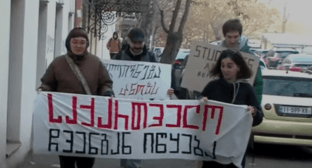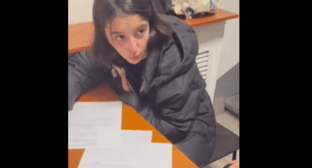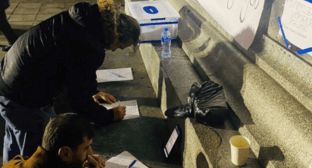13 May 2004, 13:15
IHF: conditions must be created for free and fair elections of Chechen president
The International Helsinki Federation for Human Rights (IHF) and the Moscow Helsinki Group (MHG) condemn the 9 May bomb attack at a Grozny stadium that killed at least six persons including Chechen President, Akhmad Kadyrov. The organisations call upon the Russian authorities to refrain from holding elections in Chechnya until such time as the minimal conditions necessary for a democratic ballot are established.
The bomb appeared aimed at senior officials, including General Valery Baranov, head of the Joint Group of Forces in Chechnya, who were sitting in a separate section of the central Dynamo stadium. However, the blast caused a large number of civilian victims. According to reports, at least six persons were killed and over fifty were wounded. The victims reportedly included children and elderly persons who were among a large crowd that had gathered to commemorate the fifty-ninth anniversary of the end of World War II.
"This attack was indiscriminate and disproportionate and as such constitutes a violation of international humanitarian law", stated Dr. Aaron Rhodes, Executive Director of the IHF. "Moreover, attacks of this kind cannot hope to contribute to a peaceful resolution of the situation in Chechnya; rather they multiply the victims of this brutal conflict", he added.
"However, the response of the Russian authorities to the attack must be limited to finding the perpetrators of the attack and prosecuting them in a fair trial", Dr. Rhodes stated.
Tanya Lokshina, Program Director of the Moscow Helsinki Group, who was in Grozny the day of the attack, spoke to witnesses who stated that in the immediate aftermath of the explosion Russian security forces began arbitrarily to detain young men who were present, giving rise to fears that the arrests could herald a broader crack-down.
The IHF and the MHG are deeply concerned that daily life for many Chechens living in the conflict-stricken republic continues to be a struggle for survival. Chechens continue to "disappear", a euphemism for arbitrary arrest, torture and often, extra-judicial execution. Under the rule of Akhmad Kadyrov, forces under his command were frequently blamed for carrying out raids on civilian homes and committing serious human rights violations.
"In choosing not to prosecute its forces for these human rights breaches, Russian authorities have fostered a climate of impunity for those serving in the region", Lokshina stated. "Moreover their failure to prosecute perpetuates the conflict as armed groups, as demonstrated by the 9 May attack, take the law into their own hands", she added.
The IHF and the MHG are seriously concerned that the conflict will escalate following the death of Kadyrov, particularly in light of comments attributed to Russian President Vladimir Putin in the aftermath of the bombing, who stated that "There can be no doubt that retribution is inevitable for those whom we are fighting today".
The IHF and the MHG fear that this retribution will include serious human rights violations against civilians, detainees and human rights defenders in Chechnya and neighbouring Ingushetia.
"We receive reports of disappearances, torture and extra-judicial execution in Chechnya on almost a daily basis", stated Dr. Rhodes. "This appalling record of wanton human rights abuse and climate of impunity must be addressed urgently if we are to see any improvement in the republic", he added.
Background
Akhmad Kadyrov was elected president of Chechnya in October 2003 in elections that were neither free nor fair. All of the main contenders for the post either withdrew their candidacy or were disqualified prior to election day. Monitors from Russian human rights organisations, including the Moscow Helsinki Group, documented strong evidence of fraud including ballot stuffing and inflated voter figures. The MHG reported complaints from Chechen civilians of being coerced into going to vote and being required to vote for Kadyrov.
The rules concerning the successor to Akhmad Kadyrov are governed by the Chechen Constitution which was adopted in a referendum on 27 March 2003, itself broadly condemned as flawed. Under the rules, new presidential elections must be held in accordance with federal law, i.e. within four months.
In 2003, the IHF and the MHG repeatedly warned the Russian Government and the international community that imposing Moscow's preferred candidate as president would not contribute towards creating peace and stability in the region.
The organisations reiterate their call with regard to the forthcoming presidential elections in Chechnya. The IHF and the MHG consider that minimal conditions for the holding of free and fair elections must include:
- a recognised cessation of hostilities by both sides to the conflict;
- a plurality of candidates;
- free operation of the media and guaranteed exercise of freedom of expression by all;
- the agreement of the international community, including the Organisation for Security and Co-operation in Europe (OSCE) and the Council of Europe to send observers.
Both the OSCE and the Council of Europe refused to send observers to the March 2003 referendum or October 2003 election citing free election concerns and inadequate security conditions.
Source: International Helsinki Federation for Human Rights




